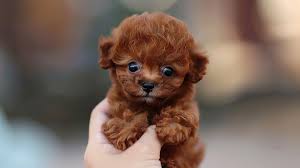Introduction:
Merle toy poodles puppies are a very beautiful variation of the best loved breed called a toy poodle, known mainly by their coat pattern, which is unique and beautiful. Merle puppies are mottled or patchy-coated dogs, at times presenting all colors of blue, gray, and chocolate mixed on their coats. Not only are these dogs cute in terms of appearance, but they also make for smart, energetic, and affectionate pets like other poodles.

Exercise Requirements
- Activity Level: While they are small, toy poodles are active and need regular exercise. Daily walks, playtime, and mental stimulation are essential to keep them healthy and happ
Overview of Merle Toy Poodle Puppies
Appearance
- Coat Pattern: The most distinctive feature of merle toy poodles is their coat, which has a mottled or patchy pattern. This can include various colors like blue, gray, chocolate, and cream mixed with lighter areas.
- Size: Toy poodles are the smallest of the poodle varieties, typically weighing between 4 to 6 pounds and standing around 10 inches tall or less at the shoulder.
Temperament
- Intelligence: Toy poodles are highly intelligent and eager to learn, making them relatively easy to train. They excel in obedience and agility tasks.
- Social Behavior: They are generally friendly, affectionate, and good with families, including children and other pets. They often form strong bonds with their owners.

Coat Maintenance: Toy poodles require regular grooming to keep their curly coats healthy. This includes:
- Brushing: Daily brushing is recommended to prevent matting.
- Professional Grooming: Regular visits to a professional groomer (every 4-6 weeks) are advisable for trimming and maintenance
Health Concerns to Watch For
Genetic Health Risks: The merle gene can lead to potential health issues, including:
- Hearing and Vision Problems: Some merle poodles may experience deafness or eye conditions like microphthalmia (abnormally small eyes) or cataracts.
Finding a Merle Toy Poodle Puppy
Visits: Visit the breeding facility to see the living conditions and meet the puppies’ parents if possible.
Research: Look for breeders who prioritize health and temperament. Ensure they provide health clearances for their breeding dogs.


Pingback: Who developed the first merle poodle : Overview
Pingback: White Merle Poodle : The Beautiful and Rare - My Blog